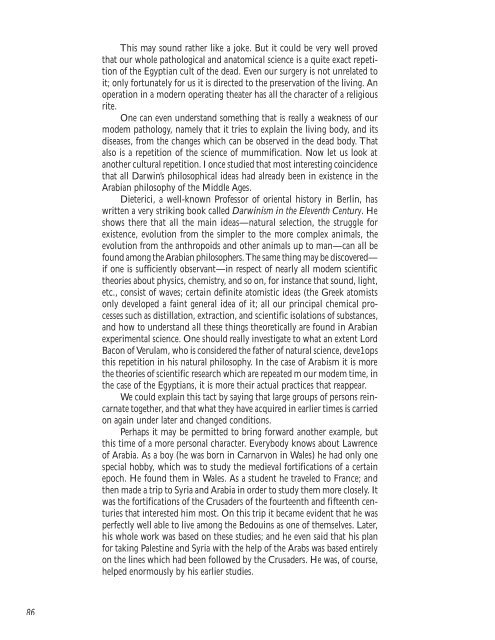Proceedings Colloquium on World History - Waldorf Research Institute
Proceedings Colloquium on World History - Waldorf Research Institute
Proceedings Colloquium on World History - Waldorf Research Institute
You also want an ePaper? Increase the reach of your titles
YUMPU automatically turns print PDFs into web optimized ePapers that Google loves.
86<br />
This may sound rather like a joke. But it could be very well proved<br />
that our whole pathological and anatomical science is a quite exact repetiti<strong>on</strong><br />
of the Egyptian cult of the dead. Even our surgery is not unrelated to<br />
it; <strong>on</strong>ly fortunately for us it is directed to the preservati<strong>on</strong> of the living. An<br />
operati<strong>on</strong> in a modern operating theater has all the character of a religious<br />
rite.<br />
One can even understand something that is really a weakness of our<br />
modem pathology, namely that it tries to explain the living body, and its<br />
diseases, from the changes which can be observed in the dead body. That<br />
also is a repetiti<strong>on</strong> of the science of mummificati<strong>on</strong>. Now let us look at<br />
another cultural repetiti<strong>on</strong>. I <strong>on</strong>ce studied that most interesting coincidence<br />
that all Darwin’s philosophical ideas had already been in existence in the<br />
Arabian philosophy of the Middle Ages.<br />
Dieterici, a well-known Professor of oriental history in Berlin, has<br />
written a very striking book called Darwinism in the Eleventh Century. He<br />
shows there that all the main ideas—natural selecti<strong>on</strong>, the struggle for<br />
existence, evoluti<strong>on</strong> from the simpler to the more complex animals, the<br />
evoluti<strong>on</strong> from the anthropoids and other animals up to man—can all be<br />
found am<strong>on</strong>g the Arabian philosophers. The same thing may be discovered—<br />
if <strong>on</strong>e is sufficiently observant—in respect of nearly all modem scientific<br />
theories about physics, chemistry, and so <strong>on</strong>, for instance that sound, light,<br />
etc., c<strong>on</strong>sist of waves; certain definite atomistic ideas (the Greek atomists<br />
<strong>on</strong>ly developed a faint general idea of it; all our principal chemical processes<br />
such as distillati<strong>on</strong>, extracti<strong>on</strong>, and scientific isolati<strong>on</strong>s of substances,<br />
and how to understand all these things theoretically are found in Arabian<br />
experimental science. One should really investigate to what an extent Lord<br />
Bac<strong>on</strong> of Verulam, who is c<strong>on</strong>sidered the father of natural science, deve1ops<br />
this repetiti<strong>on</strong> in his natural philosophy. In the case of Arabism it is more<br />
the theories of scientific research which are repeated m our modem time, in<br />
the case of the Egyptians, it is more their actual practices that reappear.<br />
We could explain this tact by saying that large groups of pers<strong>on</strong>s reincarnate<br />
together, and that what they have acquired in earlier times is carried<br />
<strong>on</strong> again under later and changed c<strong>on</strong>diti<strong>on</strong>s.<br />
Perhaps it may be permitted to bring forward another example, but<br />
this time of a more pers<strong>on</strong>al character. Everybody knows about Lawrence<br />
of Arabia. As a boy (he was born in Carnarv<strong>on</strong> in Wales) he had <strong>on</strong>ly <strong>on</strong>e<br />
special hobby, which was to study the medieval fortificati<strong>on</strong>s of a certain<br />
epoch. He found them in Wales. As a student he traveled to France; and<br />
then made a trip to Syria and Arabia in order to study them more closely. It<br />
was the fortificati<strong>on</strong>s of the Crusaders of the fourteenth and fifteenth centuries<br />
that interested him most. On this trip it became evident that he was<br />
perfectly well able to live am<strong>on</strong>g the Bedouins as <strong>on</strong>e of themselves. Later,<br />
his whole work was based <strong>on</strong> these studies; and he even said that his plan<br />
for taking Palestine and Syria with the help of the Arabs was based entirely<br />
<strong>on</strong> the lines which had been followed by the Crusaders. He was, of course,<br />
helped enormously by his earlier studies.
















